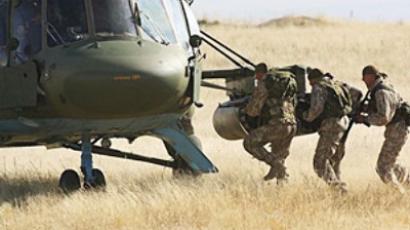ROAR: “Parties may exploit food price hikes”

As many Russians are increasingly becoming concerned with growing food prices, politicians will have to offer solutions to the problems caused by drought, the media say.
The situation with food prices is serious enough, politicians recognize. State Duma deputies have begun their autumn session with discussion on measures to stop speculative price hikes and secure fair competition on the market.
“It is obvious that, despite the current difficulties in the agricultural sector, the food security of the country has been ensured by today,” the parliament’s draft resolution said, Itar-Tass reported. The deputies described the attempts to boost prices as “absolutely impermissible and intolerable.”
All political forces should unite in this situation, State Duma speaker Boris Gryzlov said. He urged parties “not to try to raise their rating” by criticizing the authorities’ actions.
Meanwhile, political parties have begun preparations for the election campaign in the regions, which starts on September 11. “They are not going to use something new in their election campaigning, but all of them are ready to exploit the popular topic of the growth of food prices,” Kommersant daily said.
The ruling United Russia’s campaign will concentrate on regional dominating topics, Vyacheslav Volodin, one of the party’s leaders, told the paper.
The Liberal Democratic Party intends to make the food prices one of the main “social themes” of their campaign. “We are demanding that the prices be frozen and buying fever stopped,” first deputy head of the central executive body Dmitry Shlyapin told the daily.
The Communists will offer anti-crisis measures and those regarding forest fires and food, a secretary of the party’s central committee Sergey Obukhov said. The topic of price hikes “is irritating” everyone, he told the daily.
But parties might have less reason for discontent in the near future as President Dmitry Medvedev “instructed governors to control food prices,” the paper noted.
Medvedev also inspected agricultural complex and harvested potato crops in Voronezh Region on September 6. Earlier he had ordered the Agriculture Ministry and the anti-monopoly bodies to prevent attempts of groundless food prices hikes.
Considering this summer’s drought and wildfires, crop failures are significant, Medvedev noted. However, speaking at a meeting of the presidium of the State Council in Saratov on 2 September, he stressed that “latest hikes in the prices of buckwheat are speculative.”
The Russian government has imposed the moratorium on grain exports, sending world prices higher. “There are serious problems but there are also chances to resolve them,” Medvedev said at the meeting with Orenburg Region Governor Yury Berg.
Regional officials should monitor the prices of food products personally and visit food and grocery stores and markets, the president said. Those who engage in speculation must be punished, he stressed.
Russia has sufficient food grain and feed grain, Agriculture Ministry Yelena Skrynnik said on September 7. The gross grain harvest this year totals 60 million-65 million tonnes, she told deputies of the State Duma. According to her, food prices in the country are “not critical, except for buckwheat.”
The media, however, are full of articles concerning the situation with food prices. Suppliers are not reducing wholesale prices on buckwheat, popular in Russia, despite the appearance of a new harvest, Kommersant daily said.
The situation with buckwheat may stabilize after harvesting will be completed by mid-October in regions growing it, the paper said. Buckwheat will also be imported from China, the paper noted.
Meanwhile, the deputies of the Public Chamber have prepared a draft program to introduce food stamps for Russians with incomes below the subsistence minimum. Itar-Tass quoted one of the authors, Boris Altshuler, as saying that the program may help to solve “the problem of the huge number of malnourished children, who today in Russia number 11 million.”
The United Russia faction in the State Duma has also put forward the initiative for introducing food stamps for the poor.
Although some countries, including the US, have used such a system, it would be difficult to realize the idea in Russia now, Gazeta daily said. Food stamps are one of the symbols of “the Perestroika epoch,” accompanied by the deficit of food products, it noted.
Sergey Borisov,
Russian Opinion and Analysis Review, RT













